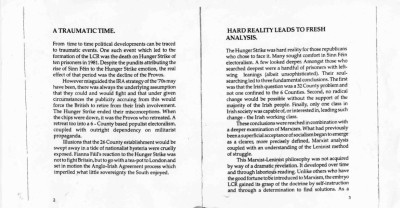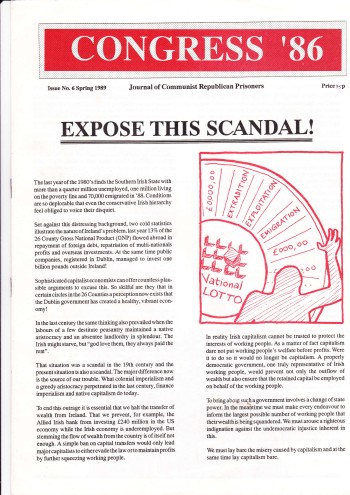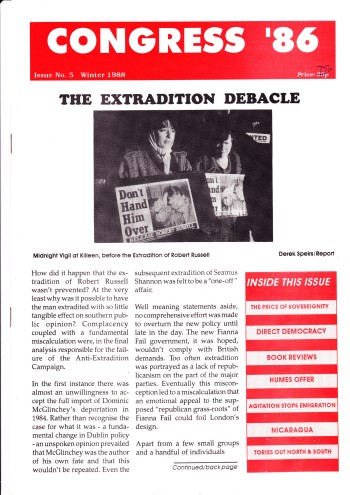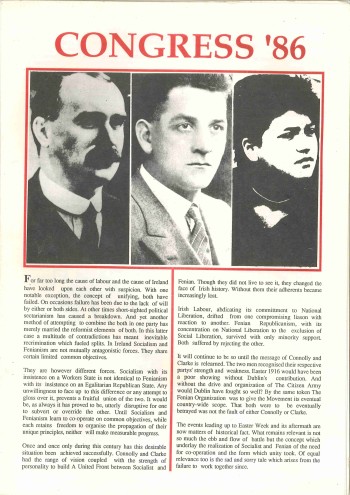From Long Kesh to a Socialist Ireland

| Date: | 1988 |
|---|---|
| Organisation: | League of Communist Republicans |
| View: | View Document |
| Errata: |
|
| Discuss: | Comments on this document |
| Subjects: |
Please note: The Irish Left Archive is provided as a non-commercial historical resource, open to all, and has reproduced this document as an accessible digital reference. Copyright remains with its original authors. If used on other sites, we would appreciate a link back and reference to The Irish Left Archive, in addition to the original creators. For re-publication, commercial, or other uses, please contact the original owners. If documents provided to The Irish Left Archive have been created for or added to other online archives, please inform us so sources can be credited.
Commentary From The Cedar Lounge Revolution
7th July 2008
Here’s a document - which may well be “From Long Kesh to a Socialist Ireland” (unfortunately it isn’t complete - lacking both a cover and back page(s) ) issued by the League of Communist Republicans in or around 1988. The LCR was an interesting group, a split from the Provisional IRA in the 1980s. For a detailed history of the LCR Fourthwrite has a piece by Liam O’Ruairc on it.
The basic overview, largely drawn from the Fourthwrite article (available here as a pdf), is as follows.
With the end of abstention by Sinn Féin at the 1986 Ard Fhéis there was a mass resignation of about 100 IRA prisoners in Long Kesh. Of this number a smaller group combined in November 1986 as the League of Communist Republicans. Their position was interesting since they argued that the armed campaign was of limited use at that point in time (and who better to know?) and that Sinn Féin was retreating from the left.
One of those pivotal to the LCR was Tommy McKearney who developed their programme (reproduced, not quite in full due to missing pages, in the last pages of the PDF above):
WE STAND FOR: 1. An independent Sovereign Republic of All Ireland. 2. A Revolutionary Democratic Government, under the control of the Workers and the Small Farmers. 3. Administration of the State to be under the supervision of a National Assembly which practices Direct Participatory Democracy, ie deputies are subject to recall. THE STATE MUST GUARANTEE ITS CITIZENS: • Work at an acceptable wage. • A home suitable to the citizen’s needs. • An education to the highest level compatible with the citizen’s ability. • Full and comprehensive healthcare. • Social Rights including: Divorce Contraception and abortion Separation of Church and State Meaningful equality between the sexes. To allow the Workers’ and Small Farmers’ State exercise control, it is imperative that the commanding heights of the economy, Finance, Trade, Industry, Production and Communication, be brought under the Democratic control of the Revolutionary Democratic Workers’ and Small Farmers’ Republic.
As can be seen this had deliberate resonances with the 1934 Republican Congress. Their slogan ‘A Workers’ and Small Farmers’ State’ was an attempt to remedy what they saw as the original error by Ryan and others at that Congress. And as a further echo of this their journal was named Congress ‘86.
Liam O’Ruairc argues in the Fourthwrite piece that:
Unlike the later split with the 32-County Sovereignty Movement, the LCR split was not well publicised. Apart from some obscure journals of tiny Marxist organisations, the media didn’t pay any attention to the formation of the League of Communist Republicans. That might have been justified if one thought that the LCR was just a tiny group without influence outside the prisons. However, looking back fifteen years later, the formation of the LCR is a fact of far greater significance. What is significant is that a group of Republican prisoners thought that it was impossible to reform the Republican movement from within, and that it was necessary to break away from it and form a new organisation. In 1986, many of the prisoners (and we are not even talking here of people outside the jails) who were for one reason or another critical of the direction Adams was taking the organisation in, believed that it was still possible to change the Provisional Republican movement from within. “The course of time has fallen on the side of those who argued that there was no internal means of changing the Republican Movement.
And there is much in that analysis. However, it also points to the paradoxical marginalisation of the armed struggle and those at the hard end by political processes outside the prisons which were encompassing much greater numbers. Without a party organisation to organise around, and the LCR was not a party, it was difficult if not near impossible to mobilise. Where the LCR did attempt to do so it was constrained by it’s larger rival.
A couple of oddities about the LCR can be pointed to. Their critique of the then campaign was quite pointed, and although not coming from a pacifist direction, it implicitly suggested that armed struggle was futile in the then existing conditions.
…for the LCR, “the limitations of legality have never really been tested. ” More significantly, the current campaign “does not enjoy broad, popular active support”. Although there is evidence for some mass participation and support (safe houses, duration of struggle, people on marches, etc.) the fact that seventy per cent of the nation is apathetic to the IRA campaign, there is effectively no mass participation. And thirdly, the IRA campaign (in the late 1980s) was stuck in a stalemate. For the LCR, the IRA campaign was not a people’s war like in Vietnam or Nicaragua, but was essentially a matter of “propaganda by the deed” more reminiscent of the individual acts of terrorism of anarchists.
Note the rhetoric about ‘people’s’ war. The LCR was moving in an odd direction as regards their motivations for splitting from the IRA. Because while they eschewed a parliamentary road to socialism they ‘agreed with tactical interventions’.
But in the Irish context, this could only be done in the South. “This means that the responsibility for making a tactical intervention in parliaments must be kept open. Reality dictates that this can only be done successfully in Leinster House. It is there that a pragmatic intervention stands the best chance of destabilising the establishment. No such option exists in Westminster. Under present circumstances, and for the foreseeable future, attendance at the British House of Commons would serve no purpose other than to validate the British imperial claim to sovereignty over Ireland.”
And added to this was an identification with the Soviet Union and the concept of a ‘vanguard’ party which would take a leading role in a reformulated Republican Congress/broad front strategy.
And yet, a further problem for the LCR was that they sought to mark out political territory that was already well covered. They had discussions with the CPI which in its Marxist orthodoxy was in some respects obviously complementary to their approach. The Workers’ Party, while jettisoning the nationalist element of Republicanism, were forging ahead politically in the South on a programme with not entirely dissimilar roots (indeed to me it is striking just how pronounced and similar the social liberalism of the LCR was as expressed in their programme). And yet they could not join one - in part due to the need to justify their previous positions, and clearly would not join the other for historical and ideological reasons (indeed a reference in the text to Sinn Féin in 1986 suggests that they (the Marxists of the LCR) should they remain within it ‘…at best could hope for a pale version of the Workers’ Party…’.
Any further material from the LCR would be very much appreciated.
11/09/2014: Note the Fourthwrite website is no longer active, but the article mentioned is available via the Internet Archive .
More from League of Communist Republicans
League of Communist Republicans in the archive



Comments
No Comments yet.
Add a Comment
Comments can be formatted in Markdown format . Use the toolbar to apply the correct syntax to your comment. The basic formats are:
**Bold text**
Bold text
_Italic text_
Italic text
[A link](http://www.example.com)
A link
You can join this discussion on The Cedar Lounge Revolution
By: WorldbyStorm Tue, 08 Jul 2008 17:06:52
Paddy, I know Ballina, Castlebar and Ballycastle pretty well. Don’t think I was ever in Kilkelly. But, yes, have heard the song.
As regards the ‘urbane and sophisticated’ Cedar Lounge 🙂 You’ve never been to Foxfield in Raheny then I take it… 😉
Reply on the CLR
By: Mick Brody Tue, 08 Jul 2008 19:01:10
few minor points…
The LCR prisoners and their dependants were under the care of RSF/Cabhair as was mentioned, but the connection wasnt there alone. LCR PoWs had both letters and articles published in Saoirse, one i remember offhand was a two parter by McKearney on the need for a new model party after the fall of the SU(!). LCR also send solidarity greetings and had statements read at RSF Ard Feisanna while in existence. RSF organised ‘welcome home ‘ parties for Tommy, the late Pat Mullin and a few other CLR prisoners. Tommy just didnt speak at Bodenstown but for over a year spoke at RSF events including being main speaker at the annual H-Block hungerstrike commemoration (plug:last Sat in Aug) He has stated on more than one occasion that RSF is the Fenian tradition today. His brother Padraig, along with friends J Lynagh and Seamus McElwaine was very close to RSF people and his parents were supporters as well. The McKearneys and O”Bradiaghs are not related. There are more than a few former CLR PoWs involved with RSF today. Tommy is no longer though he remains on friendly relations and helped out by speaking at an RPAG rally in Dungannon last year . He would have alot more in common with RSF than Id say many would be either aware of or willing to admit.
As for George Harrison , he was never a member of CPUSA though he was a regular visiter to their offices he was a member of no party in the states. He was very friendly with Michael from CPI though. He was a founding member of Cumman na Saoirse /National Irish Freedom Committee (www.irishfreedom.net – there is bio material there) The group was founded after the disaster in 86 largely by WOI/Civil war vets but not entirely. Members mostly came from the James Connolly IRA Club (which may be behind the pamplet mentioned above) and the Eire Nua Assoc. Others involved at one level or another were the writer Tom Cox, John Joe Hoey who was the last surving member of the Republican Congress (last visit home would be to attend Com Gen Tom Maguires burial) and even non Irish like Moe Fishman of the AL Brigades were very supportive. George was also a patron of Republican Sinn Fein.
Reply on the CLR
By: WorldbyStorm Tue, 08 Jul 2008 20:01:33
V. interesting Mick, but still a strange fit from the LCR to RSF (even if only in a supportive sense). I’d see RSF as quite different to the Republican Socialist tradition, indeed I’d agree that they’re much more in the Fenian or if people prefer traditional Republican tradition (which makes Ed Moloney’s defenderist thesis a bit skew ways….). But then, as splintered sunrise noted, around the island when the original Officials/Provo split occurred those who went in either direction could sometimes simply not be predicted based on their previous positions.
Reply on the CLR
By: Mick Brody Tue, 08 Jul 2008 20:29:29
Harrison once said that he was supportive of RSF over others as there was the Republic, they may be unaware, ignorant and indeed even some hostile to Marxism. But to be a Republican Socialist to him and to others like him meant to had to be Republican as well. Who else gives their allegiance to the All Ireland Republic? Who else could they have supported? Where else is Republicanism? This is not RSF ‘elitism’ but the result of others decisions to abandon it. They wouldn’t. They had and have no choice. JJ Hoey was more a Connolly Assoc kind of man politically but they had fought to defend the Republic. Harrison was no half way lefty and his good friend Mike Flannery was no commie by a long shot lol, one an atheist the other a devout catholic but where they stood united on was to the Republic. It s what made them Republicans.
Reply on the CLR
By: WorldbyStorm Tue, 08 Jul 2008 21:07:43
Indeed, and stranger alliances than that have been seen down the years …
Reply on the CLR
By: On Being Sent a Bum Steer « The Irish Pirate Review Tue, 08 Jul 2008 21:50:01
[…] THE LEAGUE OF EXTRAORDINARY COMMUNISTS […]
Reply on the CLR
By: almata Thu, 10 Jul 2008 15:09:00
I was fortunate to do the last interview Harrison gave. It goes over 4 hours and I have the entirety on video and cd. It should go to an archive. He talks extensively about his relations with the CP. George was more of a Fidelista than any other wing othe the Communist movement in my opinion. That put him to the left of the CP on a whole range of issues. He also talks about coming to the states with an IRA comrade who was influenced by Trotskyism, went to Chicago and ended up organizing around the revolutions in Latin America. I write for Fourthwrite and know Tommy pretty well. I would be wary about saying that Tommy is close to this or that tendency because he speaks at this or that event. Tommy is not a sectarian (in the left or religious sense) and will fight his corner in whatever crowd he finds himself in. George’s politics would have fit perfectly with the left-fenians to Congress in the 30’s on to today. George to wasn’t easily defined by the company he kept. He also fought his corner wherever he was.
Reply on the CLR
By: WorldbyStorm Thu, 10 Jul 2008 17:59:32
Thanks almata. They both sound like great subjects of further consideration…
Reply on the CLR
By: almata Thu, 10 Jul 2008 21:06:20
Some more complications to think about when thinking about Harrison’s politics.
Harrison’s support to the Cuban Revolution dates to before the seizure of power by the J26 and wasn’t determined by the official CP policy. Harrison organized “support” to the Border Campaign in the late 50’s. The urban wing of the J26 also received “support” from the same sources. George met the Cuban revolution and began hearing of Fidel in this context. Ironically it was the same mob that ruled Havana that was getting weapons to the movement in their backyard in New Jersey. How’s that for the dialectics of history.
I think it is important to understand that George was an internationalist whose thinking predated what would end up being thought of as “third worldism” twenty years later. In this he was also different from the CP. It should also be made clear that, while George was by no means a blind militarist, he firmly believed in the armed struggle past, present and future. His communism and his militarist beliefs put him at odds with both the left and republicans.
I really should get those interviews out. George asked that I send certain individuals copies (including McKearney and O’Bradaigh) which I did, but I haven’t followed through on my plans to get it out there in a user-friendly way.
Reply on the CLR
By: Mick Brody Thu, 10 Jul 2008 21:20:17
Almata if your last initial is S your interview was actually the second to last interview given before his death. I also made clear Tommy is no longer ‘close’ but remains ‘friendly’ with RSF and i agree his is non sectarian and would not hide any disagreement and he would have many with RSF. I agree with your assesment regarding George as more of a fidelista too, but i think you do a deservice to him by trying to downplay his very strong link with the Republican Movement. I hope this post doesnt come across as a
attack as i assure you it isnt meant to be. I can remember when George died and many socialist and republican oriented publications downplayed, if they mentioned at all his being patron of RSF or a founder of Cumman na Saoirse. George was every bit the Republican as he was a socialist he was the best of both and his dedication to the All Ireland Republic is just as worthy of remembrance as his dedication to social justice and the cause of labour. For they equally important to him and were togeather the corner he fought.
Reply on the CLR
By: almata Thu, 10 Jul 2008 21:47:06
Mick,
I am that man. I’d love to see the last interview he did. I agree with you about George’s republicanism. He saw no contradiction between his communism and his republicanism. And his republicanism was capital R Irish republicanism. I certainly didn’t mean to underplay his republicanism in my appreciation of him. I don’t come from a republican background, I come from a left background so I see George through that prism.
George is unusual, and this is to his credit, in that he felt at home and was accepted in both the left and republican circles. The last time I saw him he asked if I wanted a stack of Saoirses to distribute. He was intensely proud, in his very humble way, of his role as Patron of RSF. As you said “they equally important to him and were together the corner he fought.”
Is there a way I could get a copy of the interview?
Reply on the CLR
By: Mick Brody Thu, 10 Jul 2008 22:00:31
I was a bit suprised but i can now see i took you up wrong on that post and i apologise. I would think alot of writings and enjoy your new blog quite a bit. George was great because he was all those things, and far too many on both sides are not.
The last interview was done by a young Irish American who was a supporter of RSF but has since become very involved in the ISO. Perhaps you know who i mean? This was done as far i know almost two or three months prior to Georges death.
I don’t see why i couldnt get a copy on to you.
Reply on the CLR
By: almata Thu, 10 Jul 2008 22:46:19
Mick,
That would be great. You can contact me through my blog. I do know the person who did the interview, but I don’t think I have his contact information. If you are in contact with him can you point him my way?
All this talk of George and I went and started listening the interview again. I think comrades would find it interesting. It covers a lot of ground.
Thanks
Reply on the CLR
By: Paddy Duffy Fri, 11 Jul 2008 05:06:55
Looking forward to that interview.
“they were equally important to him and were together the corner he fought”
That’s a great way of putting it. If only there were more like him.
RSF to ISO…oh to be a fly on the wall for those mental gymnastics!
Reply on the CLR
By: WorldbyStorm Fri, 11 Jul 2008 09:28:16
Could we get a copy of it as well if it’s for public distribution?
Paddy, that’s a great point you make there about mental gymnastics…
Reply on the CLR
By: Sean Prendiville Thu, 11 Sep 2008 20:56:45
Almata, I’d be interested in getting a copy of the Harrison interview. If you’re interested in donating an archive, I’d suggest the Archives of Irish America in New York. They have his papers from the 1970s & 1980s – everything related to his gunrunning trial as well as a lot of material about his solidarity work with other groups:
George Harrison Papers (AIA 9)
[personal papers] This collection spans the 1970s to the 1990s and reflects Co. Mayo native George Harrison’s lifetime of political activism in the United States on behalf of Irish nationalism and other freedom movements around the world. In addition to biographical material, the collection includes papers related to the National Graves Association, to Republican Sinn Fein Poblachtach, to the legal case U.S. vs. Harrison, Falvey, Mullen, Gormley and Flannery, as well as to liberation movements in El Salvador, Nicaragua, Cuba and South Africa.,
Inventory available in repository. For information, contact irishamerica.archives@nyu.edu
Reply on the CLR
By: WorldbyStorm Thu, 11 Sep 2008 20:58:21
Nice one Sean.
Reply on the CLR
By: anarchaeologist Wed, 27 Jan 2010 18:17:03
Here’s the fixed link to the Fourthwrite article on the LCR
Click to access lcr.pdf
Reply on the CLR
By: Brunettes Latinas Sun, 13 Oct 2013 19:23:23
Useful info. Fortunate me I found your web site by chance,
and I am shocked why this accident did not came about earlier!
I bookmarked it.
Reply on the CLR
By: 100% Cachemire Telecharger Wed, 23 Apr 2014 15:16:29
I got this website from my friend who told me about this web
site and at the moment this time I am browsing this site and reading very
informative content at this place.
Reply on the CLR